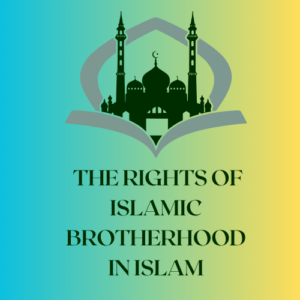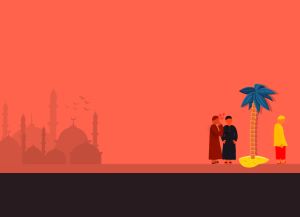
►Story of a pious girl.
►The khaleefah marries his son to her.
►The fifth rightly-guided Khaleefah is one of the descendants of that son.
Ulama Institute #1
Looking to learn Arabic or memorize the Quran?
Check our Trusted Teachers

‘Umar, the second Rightly-Guided Khaleefah, had a unique manner of keeping in touch with people. He used to go out under the cover of the darkness of the night and mingle with the masses. He did this to ascertain their well-being. and become familiar with the general condition of the Muslims. On many occasions he had certain outstanding experiences. Those experiences became widely used as examples to show the traits that constituted his excellent character as a Muslim leader.
One night, the Khaleefah, ‘Umar, walked amidst the people observing their ways and listening to their complaints. He stopped and leaned against the wall of a very modest house to rest for a while. It was in the middle of the night. The Khaleefah and his servant Aslam overheard the conversation between two women inside the house. A mother, who was a milkmaid, told her daughter, to mix the fresh milk with some water in order to increase the quantity of milk, thus increasing their profits. The young girl refused to comply, saying, “Did you not hear what ‘Umar has decreed today?” The mother asked, “What did he decree?” The young girl answered, “He has commanded someone to declare in a loud voice that milk should not be mixed with water.” The mother then said, “Get up and mix the milk with water, “Umar can- not see you here!” The girl said, “If ‘Umar does not see us, the Lord of ‘Umar does.”
When ‘Umar heard this he ordered Aslam to go to the house where this episode occurred and to enquire whether the two women were married. Aslam returned and informed the Khaleefah that the young lady was not married and that the other lady was her mother and she was not married either. ‘Umar then summoned his sons and asked them whether any of them needed to get married. His sons Abdullaah and Abdurahmaan replied that they have wives and did not need to get married. His son ‘Aasim responded and said that he did not have a wife and therefore he would like to get married to the young lady. ‘Umar consented and the two of them were married. From this union a daughter Umm ‘Aasim was born and she later on became the grandmother of “Umar ibn ‘Abd Al-‘Azeez, who was considered by many to be the fifth rightly-guided Khaleefah. He displayed the same qualities as the second khaleefah, ‘Umar ibn Al-Khattaab and the poor, honest milkmaid.
This incident holds many valuable lessons for Muslims.
- Anyone who assumes a position of authority over others, like political leaders and rulers, must realize the great responsibility that comes with their office, as did the second Khaleefah “Umar in this story. In his endless pursuit to discharge of the responsibility placed on his shoulders in the best possible manner he spent many a night amongst his people listening to them then acting in their best interest.
- The young girl in this story refused to obey her mother’s instruction to act in a manner that would displease Allah ﷻ . She preferred the pleasure of Allah ﷻ above that of her beloved mother. From this it is clear that the authority of ones parents’ is subordinate to that of Allah ﷻ and His Messenger. Allah’s Messenger ﷺ said,
“لا طاعة لمخلوق في معصية الخالق” (أحمد)
“A creature is not to be obeyed when it involves disobedience to the Creator.” [Ahmed]
- The union between a man and a woman forms the core of society. If that union is based on falsehood and deception it will definitely have an adverse effect on society. The converse is equally true, as illustrated in this story that a union based on truth and righteousness benefits society.
- The importance of having an honest income cannot be overemphasized; this episode clearly shows that the end does not justify the means. Although this family had to provide for themselves without the assistance of any male family member, it still did not justify employing devious ways to eam their sustenance. There are many narrations of the Prophet explaining the harms in eating unlawful food. The Prophet ﷺ said:
” من غش فليس مني” ( مسلم )
“Whoever cheats does not belong to me.” (Muslim)
There are many other useful lessons to learn from this incident. The most important one would be that the rewards of righteousness extend over many generations. ‘Umar’s righteousness and the piety of the milkmaid produced a Muslim ruler that benefited the entire Ummah with his uprightness and justice.







